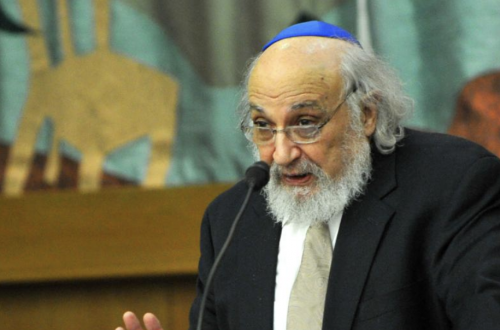Abdel Bari Atwan is a Palestinian journalist and editor of Al Quds Al Arabi (“Arab Jerusalem”), a newspaper based in London.
Tomorrow he will speak at LSE on the invitation of the university’s Palestine Society. The Society promises “a stimulating speech on the influence of the Zionist Lobby on US and UK foreign policy”.
The Israel Society and the Union of Jewish Students are dismayed:
The nature of this event is disturbing and polarising.
In previous remarks Mr. Atwan has glorified terrorism and preached violence.
Abdel Bari Atwan is on film claiming that he would dance in Trafalgar square were Israel to be attacked by Iranian missiles.
This is threatening to Jewish, Zionist, and Israeli students on campus.
They have seen their suggestion that some balance is in order rebuffed:
We welcome constructive campus debate on the subject.
It would therefore be more appropriate if a proper platform was given for others to challenge his position at this event.
We have attempted to bring a speaker to form a panel with Abdel Bari Atwan so his views can be effectively challenged.
This has been rejected by LSE Students’ Union Palestine Society.
They conclude their statement with an appeal to the university:
However, we further call on the LSE Students’ Union together with the university authorities to ensure that this event, and future events, are effectively regulated and monitored in order to maintain the welfare of all LSE students and not to give a future platform to speakers who have preached hate speech.
In response, Abdel Bari Atwan has issued this hilarious statement:
“I did not say any of the things listed on the Wikipedia site,” says Atwan. “They are false allegations, part of a smear campaign against me”.
Could Mr Atwan kindly explain how his own words are smears? He is most notorious for saying this:
If Iran reaches a deal with the Americans, what will be its bottom line? That Iran will have a nuclear program, and even if it does not manufacture nuclear weapons in the next 5-10 years, it will do so later. One of the fruits of such a deal would be a significant Iranian role in the region. Iran will remain a regional military power, which will threaten, or rather, will control and have hegemony over the region. If a war breaks out, where will the Iranians retaliate? If Iran is able to retaliate, it will burn the oil wells, block the Straits of Hormouz, attack the bases in the Gulf, and Allah willing, it will attack Israel as well. If the Iranian missiles strike Israel – by Allah, I will go to Trafalgar Square, and dance with delight if the Iranian missiles strike Israel.
Here’s the tape.
In fact, the man has a long record of disgusting and extreme statements. Try these odes to Saddam Hussein:
Arab public opinion wonders who deserves to be tried and executed: Saddam Hussein who preserved the unity of Iraq, its Arab and Islamic identity and the coexistence of its different communities such as Shias and Sunnis … or those who engulfed the country into this bloody civil war.
…
He also thought people in the wider Arab world would remember the former Iraqi leader fondly.“The Arab people will remember President Saddam Hussein as the sole Arab leader who fired 40 missiles into Tel Aviv and stood with the Palestinian resistance,” he said.
Yes the mass murderer of Iraqi Shias and Kurds was a wonderful unifier and a hero too for lobbing missiles at Israel in the Gulf War of 1991.
Atwan also goes in for Israelis-are-Nazis slurs. Here is one example, with a Zionists-run-the-media swipe thrown in:
The spectre of the Nazi holocaust which so affected previous generations is being replaced by the present reality of Israel’s holocaust in Gaza and a new grass-roots groundswell of sympathy for the Palestinians.
The powerful Zionist lobby may exercise unreasonable constraints on the media here, but it is losing control of public opinion.
Even his reaction to the LSE controversy includes a call for Israel’s destruction:
In his memoir A Country of Words he advocates a one-state solution in which Jews and Arabs would live peaceably together.
“Peaceably”? With Hamas? Yeah, right.
LSE’s code on freedom of speech does appear to leave it some leeway to bar speakers.
The Palestine Society certainly supports “no platform” moves:
We believe in a no platform policy for fascists and racists and we disrupted a lecture by Ayalon, the racist MK from apartheid Israel in 2009.
Will they shout down their own speaker on Monday? They can hardly complain if others do.
Debates about bans are important but one should not get bogged down. There are other issues to address.
What about LSE leaders, for starters? They should be very concerned that some of their students want to hear from a man who would “dance” if Israel were annihilated in a nuclear attack.
Appropriately enough, Professor Chris Brown is a member of the university’s free speech group. He knows the Palestine Society well from the Ayalon event, when he had a run in with Mira Hammad, the Society’s chair:
In a letter to the Dean of Undergraduate Studies Jan Stockdale, Mira said: “I was sitting in the row behind Janet Hartley, George Gaskell and Professor Chris Brown who, after I had interrupted saying that I did not wish to listen to a racist, told me to “fuck off””
“At the time, I did not know who he was and was shocked when I was told afterwards by three witnesses that the man who had addressed me in such an aggressive manner was indeed one of the most senior academics at the LSE.”
In reponse, Professor Brown said: “I did indeed attend the lecture and was distressed at the outbursts by some of the students. I regret if my response was distressing in turn.”
It is a shame that debates about Israel and Palestine descend to this level. Unfortunately it is groups like LSE’s Palestine Society that take them there. If they can be led out of the pits of hatred, that would be wonderful. If they cannot, at the very least their location should be critically noted.
The meeting’s organisers say it is free and open to all. It will be held in Clement House LSE, Room D502, at 6:30 on Monday.

